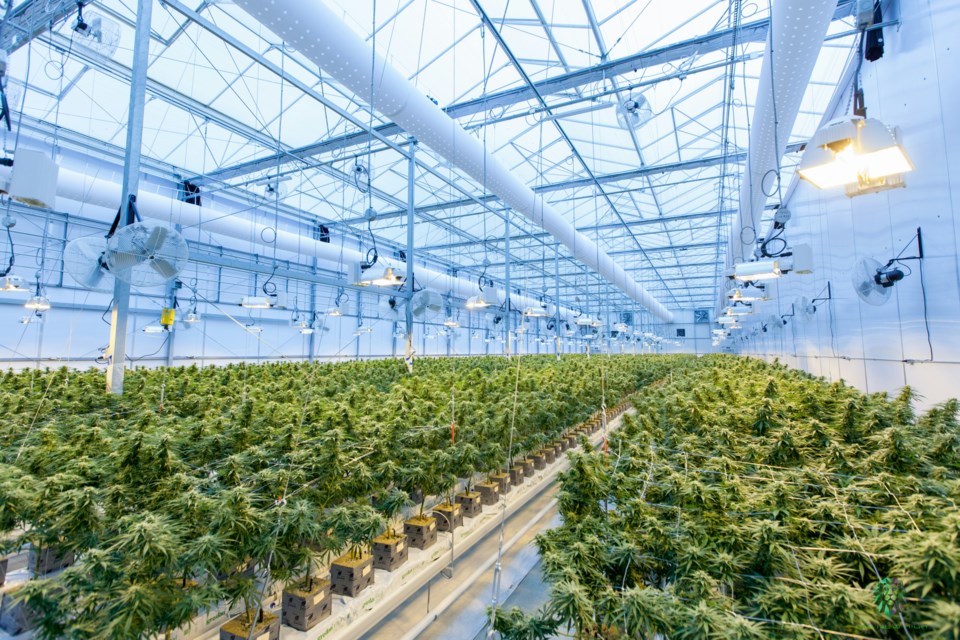B.C.’s cannabis industry is facing disruptions from tariffs, at a time when the sector is already facing challenges.
Supply chains, in the form of packaging materials and cultivation equipment, are the areas where tariffs are having the most impacts on cannabis producers, said DIG360 executive retail advisor Rick Bohonis in an email response.
The cannabis product itself is not being impacted, as cannabis imports and exports between Canada and the U.S. are not allowed, he said. Increased costs from tariffs affect ancillary products like mylar packaging, aluminum cans, batteries and child-resistant containers imported from China, said Bohonis.
This industry is no different than other industries in how they deal with rising costs—will producers eat the increased costs or pass them on to consumers, he said.
U.S. President Donald Trump imposed wide-reaching 25 per cent tariffs on Canadian goods on March 4, which was subsequently countered by Prime Minister Mark Carney with tariffs on $30 billion worth of American goods, including steel and aluminum products, and even large appliances.
Canada has also imposed tariffs on Chinese steel and aluminum.
Costs and the consistency of being able to purchase the equipment and supplies amid the uncertainty is a concern for Margaret Brodie, CEO of Vancouver-based cannabis producer Rubicon Organics Inc.
Rubicon has experienced a rise in costs of equipment, packaging and other hardware products. These products make up around 10 per cent of the company’s expenditures, but rising costs are still significant, she said. The company’s biggest expenditures are on labour and local products like soil, according to her.
“It’s also the stress of knowing, will product prices go up,” said Brodie, who’s also a board member of the Cannabis Council of Canada. “It’s the uncertainty that is challenging.”
B.C. wholesale cannabis sales during the first three months of 2025 were $144 million, up 9 per cent from $132.1 million for the same period in 2024, according to a Q4 2024 quarterly sales report by the BC Liquor Distribution Branch (BCLDB).
There were 38 million grams of cannabis sold in the first quarter of 2025, which is a 12.8 per cent increase from 33.7 million compared to the first quarter 2024, showed the report.
Micro-cultivator Great Gardener Farms Inc. hasn’t been impacted by the tariffs thus far, said CEO Kirk Tousaw. The Cowichan Valley-based producer hasn’t purchased equipment lately, and their packaging is provided by a B.C. company that manufactures locally, said Tousaw.
However, the uncertainty created by the tariffs certainly isn’t helping the sector’s already challenging state, he said.
Brodie from Rubicon said the Canadian cannabis sector is overtaxed and overregulated. This makes it challenging to compete with the legacy market, she said, estimating that 20 per cent to 40 per cent of cannabis consumers still buy from that market. Brodie also highlighted the drop in cannabis prices, partly from oversupply.
B.C. cannabis wholesale prices in Q1 2025 were $3.8 per gram, a 2.6 per cent decrease compared to last year at $3.9 per gram, according to the BCLDC report. The price of dried flower also decreased by 1.9 per cent between those same time periods, going from $3.21 per gram to $3.15 per gram.
Rubicon’s main concern is on consumer spending shifts caused by inflation rather than supply chain disruptions, said Brodie. The possibility of a recession in Canada can make it difficult to attract investment and banks have taken a conservative stance when lending money, she said.
For Bohonis, cannabis sale margins are already thin and there may be no wiggle room for marginal price movement. The concern, from the legal cannabis world, is that rising prices could lead consumers to look to the grey market again, he wrote.
The cannabis industry is a difficult sector to be in at the moment, said Tousaw. “We're not revenue positive… it's been a slog meeting all of the regulatory requirements necessary to operate,” he said.
Industry headwinds have led companies to adjust, and while some cannabis companies have diversified and pivoted to exporting a portion of their products, Rubicon has stayed focused on the premium Canadian consumer, said Brodie.
“In the future, we will be going internationally,” she said, adding that it’s challenging to diversify their import partners because there aren’t many alternatives.
Canada exported 79,300 kg of dried cannabis in 2023 and 109,000 kg in 2024 up to September, according to medical cannabis data from Health Canada.
A total of 8,651 litres of cannabis oil were also exported in 2023, as well as 13,604 litres in 2024 up to September, according to Health Canada.
Great Gardener Farms is looking to reach other provincial markets amid trade uncertainties, said Tousaw. The company is working with a processor in Manitoba, but different provinces have their own regulatory pathways, which are difficult to navigate, he said.
Trade disputes are bringing challenges for local producers, but they could also be opening opportunities for Canada to use its talent and infrastructure to take the lead on the global cannabis stage, said Brodie.



